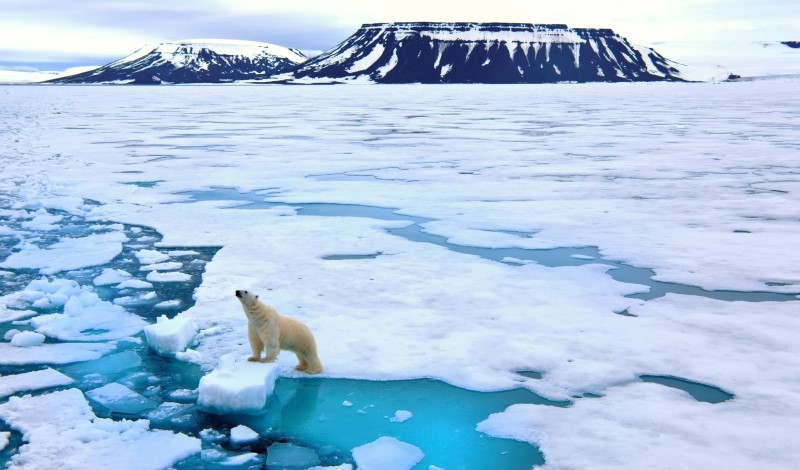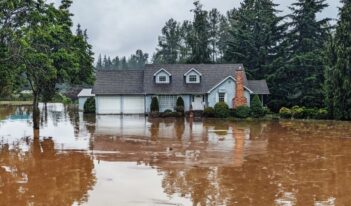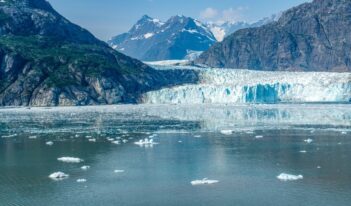
Scholars discuss the challenges of international regulation in a changing Arctic.
Temperatures in the Arctic—the Earth’s northern polar region—are rising at three times the global average. Summer 2023 was the warmest summer recorded in the region. And with sea ice declining in the Arctic Ocean since at least 1978, scientists contemplate the possibility of an ice-free Arctic Ocean.
Rising temperatures already devastate the Arctic environment. But ice and snowpack reduction will allow access to some of the planet’s largest remaining deposits of minerals, oil, and gas. Developing these deposits would disrupt local ecosystems and worsen global climate change by introducing vast new sources of fossil fuels into the global economy.
The reduction in sea ice is also opening new trade routes. In the last decade, Artic Ocean shipping grew 37 percent—a trend scholars expect will continue. More shipping means greater environmental impacts on Arctic water, air, and wildlife. The increased possibility of an oil spill in ice-covered waters represents a grave risk given the sensitivity of the Arctic marine environment and the inadequacy of current clean-up technology in icy conditions.
Environmental risks may be greater than the increase in shipping volume suggests. New Arctic shippers often hail from non-Arctic nations—including little-regulated ships sailing under flags of convenience—and are less likely to have the knowledge, skills, and equipment to handle severe weather, remoteness, and lack of support in the region’s waters. The effects of climate change only compound these risks by contributing to unpredictable sea routes, more frequent and severe storms, and more floating ice as previously stable ice fields and glaciers break down.
Arctic Indigenous peoples disproportionately bear the effects of climate change. More than 70 native communities in the Alaskan Arctic face climate-related erosion, flooding, or thawing permafrost. Native homes, infrastructure, and livelihoods are threatened across the Arctic, and entire communities may require relocation in upcoming years.
The United Nations Convention on the Law of the Sea (UNCLOS) and other United Nations maritime conventions offer broad legal and regulatory frameworks for disaster risk reduction, pollution mitigation, and international cooperation in the Arctic. In 2017, the U.N. adopted the mandatory Polar Code, which aims to increase safety and reduce the environmental impacts of Arctic maritime shipping. Some scholars argue that the international law of the sea and these U.N. agreements are the best regulatory and legal framework to address evolving risks to the environmental and human welfare in the Arctic.
In recent years, geopolitical tensions have undermined international initiatives in the region. The Arctic Council—the most important forum for intergovernmental cooperation on Arctic issues between the Arctic nations—has refused to work on projects with Russia while the war in Ukraine is ongoing. Some policymakers therefore suggest that NATO should take a leadership role. But Russia holds the most Arctic territory of any nation and is responsible for the greatest share of increases in shipping volume and resource development in the region. Tensions between Western Nations and Russia thus present grave challenges to effective international governance in the Arctic.
In this week’s Saturday Seminar, scholars discuss international regulation and governance in a warming Arctic.
- In a report for the Center for American Progress, Sam Zeno and Jenny Rowland-Shea argue that U.S. public land regulations in the Artic must consider the full climate impacts of developing the region’s vast oil and gas reserves. The Arctic, Zeno and Rowland-Shea note, holds an estimated 13 percent of the world’s undiscovered oil and 30 percent of its undiscovered gas, and Alaska holds 62 percent of all carbon on U.S. lands. Rowland- Zeno and Rowland-Shea warn that the development of these reserves would worsen climate change by delaying the clean energy transition. Drilling can severely disrupt wildlife and destroy Arctic ecosystems, jeopardizing one of the planet’s great remaining wildernesses and threatening native communities’ subsistence, Zeno and Rowland-Shea explain.
- In an article in Transportation Research Part D: Transport and Environment, Henry P. Huntington and several coauthors argue that the rising importance of Arctic shipping requires new and innovative international political and regulatory frameworks. The Huntington team approves of the forward-thinking Polar Code—especially “precautionary” provisions imposing demands designed to evolve with increased scientific understanding of the Arctic environment. Huntington and his coauthors remain optimistic about the prospects of global cooperation, noting Russian interest in developing domestic and international governance capacity in the region. Ultimately, the Huntington team concludes that other Arctic nations must muster corresponding attention and investment to ensure the laws-based future of a region of vast environmental and growing economic importance.
- In a recent report for the Brookings Institution, Jeremy Greenwood, a Commander in the S. Coast Guard, emphasized that the United States must respond to the challenges facing the Arctic. Greenwood recommends substantial infrastructure investment in Alaska—including climate-risk and impact mitigation projects—the purchase of additional Coast Guard icebreakers, and increased cooperation with regional NATO allies to uphold the rules-based international order in the Arctic. Recognizing Russia’s significant role in the region, Greenwood calls for the United States to reengage with Russia in the Arctic Council to foster cooperative international responses to political and environmental challenges and avoid a counterproductive descent into great-power competition.
- In a recent paper, Stefan Kirchner of Finland’s University of Lapland explores the evolution of Arctic law, emphasizing its increasing relevance due to climate change and globalization. Kirchner notes that, unlike Antarctica, the Arctic lacks a uniform legal framework and relies instead on treaties and voluntary cooperation between eight Arctic nations. Nonetheless, as Kirchner emphasizes, Arctic law is developing quickly and increasingly aligns with global legal norms. For instance, Kirchner explains that UNCLOS and Arctic Council agreements showcase a shift from non-binding to binding international norms in the region. Kirchner concludes that the voices of local stakeholders, including Indigenous communities, must be included in this process to realize the promise of emerging legal and regulatory frameworks in the Arctic.
- In an article in the Yearbook of Polar Law Online, Vonintsoa Rafaly, a lecturer in law at the University of Gothenburg, discusses the proper legal framework for regulating the Arctic Ocean to fight climate change. Rafaly characterizes the current Arctic governance as “polycentric” and “fragmented.” Rafaly points out that the absence of an official Arctic treaty and overarching legal framework creates conflicts between the various regulatory bodies overseeing the region’s maritime activities. Rafaly argues that this tension could be alleviated if all of the various treaties governing the Arctic Ocean were interpreted under a single “teleological” principle: The law requires what is best for the planet and human welfare.
- In a recent article in the Human Rights Law Review, Lisa Mardikian of Brunel University of London and Sofia Galani of Greece’s Panteion University examine attempts to mitigate the impact of climate change on Arctic Indigenous communities using regional human rights law and the law of the sea. Mardikian and Galani consider multiple solutions, including safeguarding Indigenous rights to property, land, and income, as well as ensuring the preservation of the Arctic environment and marine resources. In particular, Mardikian and Galani emphasize the importance of the law of the sea in ensuring sustainable Indigenous food security. Ultimately, Mardikian and Galani urge international tribunals to adopt proactive measures to ensure Arctic peoples’ survival and cultural preservation amid climate challenges.
The Saturday Seminar is a weekly feature that aims to put into written form the kind of content that would be conveyed in a live seminar involving regulatory experts. Each week, The Regulatory Review publishes a brief overview of a selected regulatory topic and then distills recent research and scholarly writing on that topic.



